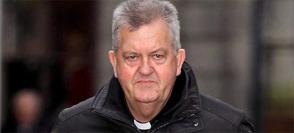By David Quinn
Irish Independent
November 25, 2011
http://www.independent.ie/opinion/analysis/david-quinn-badly-clouded-judgment-has-no-place-in-the-media-2945731.html
 |
Here's one question among all the others that the government-ordered investigation into RTE's 'Mission to Prey' programme should consider: had that programme 'merely' accused Fr Kevin Reynolds of raping a minor, but not of fathering her child, what would have happened?
Would Fr Reynolds have won his libel action? Indeed, would he have taken a libel action at all?
The accusation that Fr Reynolds raped a minor was not scientifically testable. It would have been Fr Reynolds's word against that of the alleged 'victim' and in the current climate a priest would have a hard job convincing a jury of his innocence.
But the accusation that he also fathered a child was scientifically testable and it was because of this that Fr Reynolds was able to clear his name with relative ease.
However, the initial advice Fr Reynolds received from his lawyers was that he should "go for a long holiday" and not challenge "the might of RTE".
So if this was the advice when a paternity test was available that could clear his name, imagine what the advice would have been if such a test wasn't available?
The chances are that Fr Reynolds would have gone off on his long holiday, disgraced forever, and the team behind 'Mission to Prey' would have ridden off into the sunset, picking up plaudits for their latest 'expose'.
It must not in the future take something as black and white as a scientific test to persuade us that a given RTE programme might be flawed both in its conception and its execution. Some other criteria must be developed by which we may judge the objectivity of an RTE programme, otherwise we are setting a very low bar for the station.
Indeed, Fr Reynolds might not have taken his case at all, even with the paternity test, were it not for the help of the Association of Catholic Priests (ACP), who put him on to a lawyer who was willing take on the might of RTE.
Other commentators have already expressed bewilderment at the fact that 'Prime Time Investigates' didn't delay broadcasting 'Mission to Prey' until the results of the paternity test came back.
But perhaps the reason is that, in the case of priests, the presumption of innocence has now been lost, replaced by a presumption of guilt, and it was this presumption that made RTE so confident that Fr Reynolds was guilty.
The investigation into 'Mission to Prey' must examine the possibility that RTE has indeed effectively replaced the presumption of innocence with the presumption of guilt. It cannot assume that this incident is merely an aberration and the mistake simply lay in not awaiting the results of the paternity test.
It must also consider whether the ACP is correct when it says: "There is a serious anti-Catholic and anti-priest bias among sections of the media, including some in the national broadcaster, and that this had led to a one-sided and unfair presentation of issues to do with church and clergy in recent years."
In support of its contention, the ACP has been citing a poll conducted by Amarach Research and commissioned by The Iona Institute (which I head) showing that 42pc of the public believe at least one in every five priests has abused a child. And 17pc believe it is at least one in two.
This totally false perception did not arise out of nothing. It arose in the first place from the church's grotesque failures in this area, but also from reporting that has, in the words of Helen Buckley, one of the Ferns Report authors, been disproportionately focused on clerical child abuse at the expense of all other forms of child abuse.
In any system of justice, the rights of the accuser and the rights of the accused must be properly balanced. In the present climate, the rights of accused priests and religious have been seriously compromised and that can only result in injustice.
Apart from Fr Reynolds, we would do well to recall the case of ex-Mercy Sister Nora Wall, who was wrongfully convicted for the rape and indecent assault of a 10-year-old girl in a care home in Waterford and sentenced to life in prison in 1999 only for the sentence to be quashed.
Ms Wall was sentenced shortly after the airing of the 'States of Fear' series, which dealt with abuse in religious-run institutions.
When the State finally admitted in 2005 that Ms Wall was the victim of a miscarriage of justice, an 'Irish Times' editorial said that the jury in her trial must have been affected by the huge public anger unleashed by 'States of Fear'. In other words, the jury allowed emotion to cloud their judgment.
This investigation must discover what it was that so badly clouded RTE's judgment in this instance, and whether this same poor judgment is seeping into other programmes.
Any original material on these pages is copyright © BishopAccountability.org 2004. Reproduce freely with attribution.